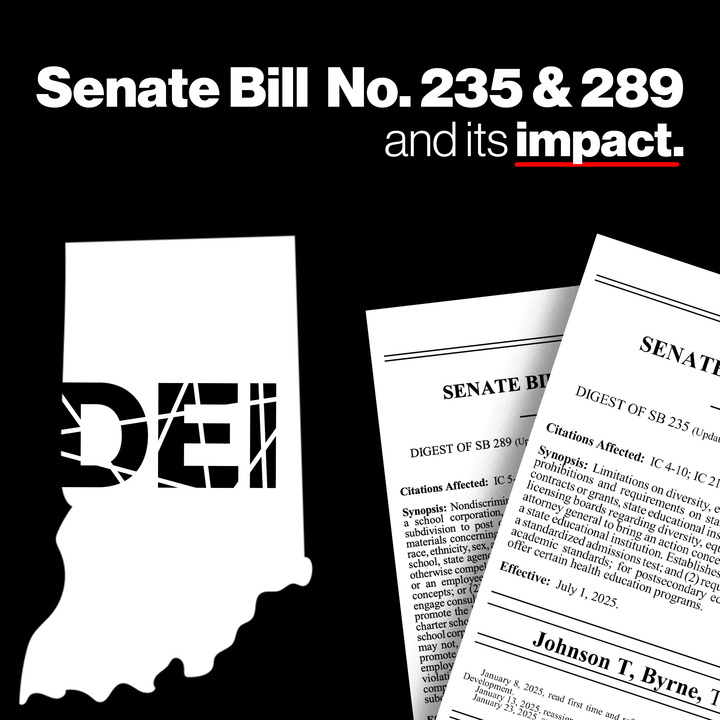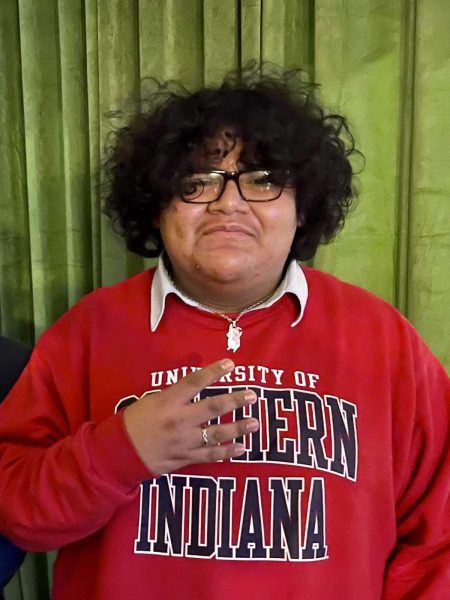Here at USI, there are a multitude of clubs and organizations that are cultural including student unions (Hispanic, Black, Asian), allyship like Sexuality and Gender Alliance (SAGA), faith-based like fellowships, ministries, communities, awareness promotions, feminism/freedom political alliances, assemblies, various associations and so on.
Then there is the Multicultural Center in the Fireside Lounge of UC East which houses a few of these. They all fall under diversity, equity and inclusion (DEI).
Justice, Equity, Diversity and Inclusion (JEDI) is USI’s version of DEI that helps students and faculty who are marginalized by giving out training and resources such as introductions to DEI, what implicit bias is, how to spot microaggressions and knowing what emotional intelligence is.
But with the new power senate bill 289, this could all change or go away. Senate Bills 235 and 289 have merged to become one and insure no overlap in policies similar to each other.
Both bills were built to weaken DEI efforts as well as give limits and restrictions to initiatives in state agencies, educational institutions and health professions. While senate bill 235 has been deemed inactive by the Indiana General Assembly, 289 threatens to eliminate related programs, organizations and initiatives.
The American Civil Liberties Union (ACLU), a non-profit organization that works to defend the liberties and rights outlined in the US Constitution, is opposed to the bill saying it is an attack on the principles and programs that build diversity, equity and inclusion.
The ACLU said, “As Indiana becomes increasingly diverse, elected officials need to invest in programs and practices that make Hoosiers feel welcome as students and state and local employees.”
They go on to say “Among other things, DEI practices and non-discrimination trainings increase the likelihood that educational and workplace environments will be ones where all students and employees have equal opportunity to succeed. This bill is another large step in the wrong direction for Indiana.”
235’s title was “limitations on diversity, equity and inclusion.” The synopsis stated it was to establish prohibitions and requirements on DEI expenditures.
It was authored by Senators Tyler Johnson and Gary Byrne on Jan. 8. Before merging with 289, it initially prohibited the use of public funds for DEI offices, programs or officers as well as universities from conducting DEI audits or hiring DEI consultants and DEI-related audits or consultant engagement for professional licensing.
It would have also required institutions to certify that they do not enforce DEI-based training for employees or grant recipients, would need universities to report efforts on intellectual diversity and free speech and would have enforced not requiring DEI training for obtaining or renewing a health license.
289 titled “Nondiscrimination in employment and education” has become an “umbrella bill” that keeps core restrictions but modifies them to ensure the passage and enforcement of the measures.
For example, when 235 says it aims for the prohibition to “promote as the official position of an agency a particular opinion referencing:
- (A) unconscious or implicit bias;
- (B) cultural appropriation;
- (C) allyship;
- (D) transgender ideology;
- (E) microaggressions;
- (F) group marginalization;
- (G) antiracism;
- (H) systemic oppression;
- (I) social justice;
- (J) intersectionality;
- (K) neopronouns;
- (L) heteronormativity;
- (M) disparate impact;
- (N) gender theory;
- (O) racial or sexual privilege; or
- (P) any related formulation of the concepts under clauses (A) through (O)”
289 says similarly it will prohibit state agencies, state educational institutions and health profession licensing boards “(3) Promote or promulgate policies or procedures designed or implemented with reference to race, sex, color or ethnicity that are not policies or procedures approved in writing by the attorney general for the sole purpose of ensuring compliance with any applicable court order or state or federal law. (4) Promote or promulgate training, programming, or activities designed or implemented with reference to race, sex, color or ethnicity that are not training, programming, or activities developed by an attorney and approved in writing by the attorney general for the sole purpose of ensuring compliance with any applicable court order or state or federal law.”
With the absorption of both bills, it will allow the authors to consolidate efforts against DEI programs so they don’t split legislative support (review and implementation). It refines language and lowers penalties for less and weaker opposition. Lastly it tries to broaden impact to other types of schools and state agencies rather than just higher education.
How would this affect the University of Southern Indiana? Potential restructuring, elimination and/or defunding of anything that doesn’t adhere with the bill.
USI will need to eliminate DEI-funded offices, training and initiatives. Additionally, the university would most likely be laying off DEI consultants and counselors. Minority students, LGBTQ+ students and other historically marginalized groups may lose university-sponsored resources and support programs.
Faculty and staff may see shifts in hiring policies and training requirements as well as students seeing less training opportunities for various things like admissions, activities, and cohorts. Health-related programs may have to adjust admission and grading policies. The university will face legal and financial risks if it does not comply with the law. $250,000 fines could hurt the school for promoting and pushing DEI at all. Most importantly, student activism may shift to private or off-campus efforts to continue DEI advocacy.
Without DEI initiatives, USI may struggle to attract diverse faculty, staff, and students, potentially impacting its reputation. While professors can still discuss race and gender topics, USI must be careful to avoid content that could be seen as promoting certain DEI principles, possibly leading to self-censorship.
Alex Mendoza is the news editor of The Shield. This analysis contains his opinions.




